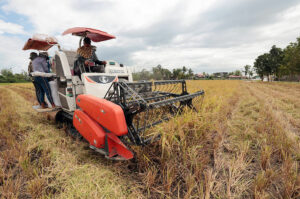PHILIPPINE Center for Postharvest Development and Mechanization (PhilMech) said that the low utilization levels for the Rice Competitiveness Enhancement Fund (RCEF) were caused by delayed initial disbursements.
PhilMech Senior Science Research Specialist Elijah Z. Davalos said that the low utilization for the first three years of the program is due to the “late downloading of funds” during its first year of implementation in 2019.
“It created a domino effect as another P5 billion for 2020 was added without the first allocation (having been spent),” Mr. Davalos was quoted as saying in a statement issued by the Department of Agriculture (DA).
Republic Act No. 11203 or the Rice Tariffication Law allocates P10 billion from rice import tariffs a year for six years to RCEF.
From this, PhilMech gets a P5-billion annual allocation to fund the farm mechanization component of RCEF. PhilMech is tasked with distributing farm equipment to qualified rice farmers, as well an additional P100 million for farm extension activities.
“Likewise, the pandemic largely restricted immediate machine distribution and rapid disbursement of funds during the first half of project implementation,” the DA said.
He said the backlog of unutilized funds from previous years is now “fully spent and accounted for.”
Mr. Davalos said that the Bids and Awards Committee has conducted bidding for fourth quarter spending items to fast-track fund disbursement.
PhilMech is constructing an assembly line in its Agricultural Mechanization Design and Prototyping Center, which is due to start operations by the fourth quarter, he said. — Sheldeen Joy Talavera

